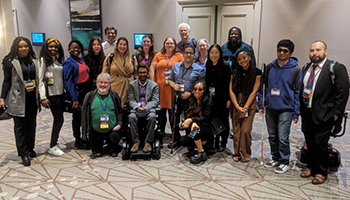 For the first time, the two CRA-WP Grad Cohort career development workshops were held simultaneously in Minneapolis, Minnesota from April 11 to 13, 2024. The first and the oldest is the CRA-WP Grad Cohort for Women that began in 2004 while the second is the CRA-WP Grad Cohort for Inclusion, Diversity, Equity, Accessibility, and Leadership Skills (IDEALS) that began in 2018. AccessComputing is a bronze sponsor for both events. A total of 238 graduate students and 41 mentors attended both workshops combined. Some of the sessions were plenary with both groups combined and some were separate and held simultaneously. A total of 34 graduate students in the combined workshops identified as disabled, some of them AccessComputing Team members. Among the mentors were the new AccessComputing PI, Maya Cakmak, former PI Richard Ladner, Co-PI Raja Kushalnagar, partner from Duke, Susan Rodger, and former partner from Colorado, Shaun Kane. Ather Sharif, who is an AccessComputing student who will soon graduate with a PhD from the University of Washington, served as a mentor. He has attended all the Grad Cohort for IDEALS since 2018, first as a graduate student, eventually moving to being a fantastic mentor.
For the first time, the two CRA-WP Grad Cohort career development workshops were held simultaneously in Minneapolis, Minnesota from April 11 to 13, 2024. The first and the oldest is the CRA-WP Grad Cohort for Women that began in 2004 while the second is the CRA-WP Grad Cohort for Inclusion, Diversity, Equity, Accessibility, and Leadership Skills (IDEALS) that began in 2018. AccessComputing is a bronze sponsor for both events. A total of 238 graduate students and 41 mentors attended both workshops combined. Some of the sessions were plenary with both groups combined and some were separate and held simultaneously. A total of 34 graduate students in the combined workshops identified as disabled, some of them AccessComputing Team members. Among the mentors were the new AccessComputing PI, Maya Cakmak, former PI Richard Ladner, Co-PI Raja Kushalnagar, partner from Duke, Susan Rodger, and former partner from Colorado, Shaun Kane. Ather Sharif, who is an AccessComputing student who will soon graduate with a PhD from the University of Washington, served as a mentor. He has attended all the Grad Cohort for IDEALS since 2018, first as a graduate student, eventually moving to being a fantastic mentor.
One of the highlights of the Grad Cohort for IDEALS was a panel titled “Empowerment of People with Disabilities.” Richard Ladner moderated the panel with panelists Raja Kushalnagar, Susan Rodger, and Ather Sharif. Each told their own stories about their road to empowerment and also answered questions about what empowerment means to graduate students with disabilities generally. There were many questions from the audience of about 35 students and mentors. Another interesting panel session was titled “Navigating Micro-aggressions & Finding Your Voice.” The panel was moderated by Hakeem Weatherspoon, with panelists Alicia Nicki Washington from Duke, Monica Anderson from the University of Alabama, and Ather Sharif from the University of Washington who replaced another panelist that couldn’t attend. A micro-aggression is a small and often unintentional act that is discriminatory or belittling by a person toward another person who is in a marginalized group. One example brought up by Ather, who uses a motorized wheelchair, is when someone attempts to talk to him by addressing the person standing next to him, e.g. “Can you ask him if he would like a glass of water.” Ather called it the “infantilization” of a disabled person. It was fascinating, and sometimes unnerving, to hear from both the panelists and members of the audience of examples of microaggressions. There was also a lot of good advice from the panelists on how to respond to these microaggressions when they occur and what to say when you are called out for doing one yourself.
Other sessions in the Grad Cohort workshops included topics on how to find and work with a research advisor, building resilience and overcoming failure, preparing a thesis proposal, school-life balance, comparing academic and industry jobs. Students also gave lightning talks and presented posters about their research. At the end of the prepared sessions, students could meet with mentors one-on-one for individual mentoring.